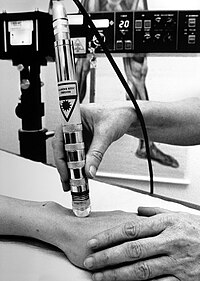
Photo from wikipedia
Background The standard therapeutic approach for locally advanced head and neck cancer is optimal use of radiation therapy with or without concomitant chemotherapy. The most common and distressing acute complication… Click to show full abstract
Background The standard therapeutic approach for locally advanced head and neck cancer is optimal use of radiation therapy with or without concomitant chemotherapy. The most common and distressing acute complication of such therapies is oral/pharyngeal mucositis that may be associated with severe morbidity and can interfere with the planned administration of therapy. Methods We have identified all patients diagnosed with head/neck cancer between 2005 and 2009, having received radiotherapy with or without cisplatin-based chemotherapy. Radiotherapy consisted of intensity-modulated radiation therapy (IMRT) in all patients. In patients with grade > 2 mucositis, photobiomodulation (PBM) consisted of three sessions of low-level laser irradiation weekly, in accordance with recently published recommendations for PBM. Patients who did not receive PBM were those for whom that approach was not requested by the radiotherapists and those who declined it. Results Two hundred twenty-two patients (62%) received PBM and 139 did not (39%). The patient’s characteristics were equally distributed between the two groups. For overall survival, time to local recurrence, and progression-free survival, there was no statistical evidence for a difference in prognosis between patients with and without PBM. In a multivariate analysis, after adjusting for known prognostic factors, we found no statistical evidence that PBM was related to overall survival, progression-free survival, or local recurrence. Conclusions Our results show evidence of no effect of PBM upon overall survival, time to local recurrences, and disease-free survival of patients with head and neck cancer treated with radiotherapy with/without chemotherapy.
Journal Title: Supportive Care in Cancer
Year Published: 2019
Link to full text (if available)
Share on Social Media: Sign Up to like & get
recommendations!